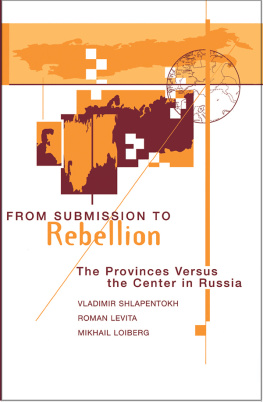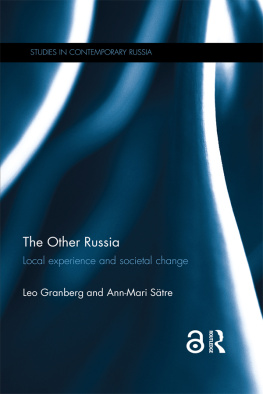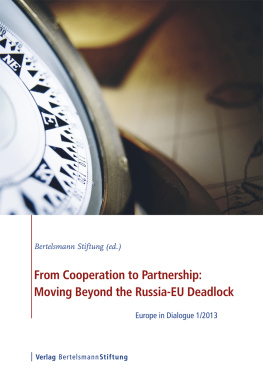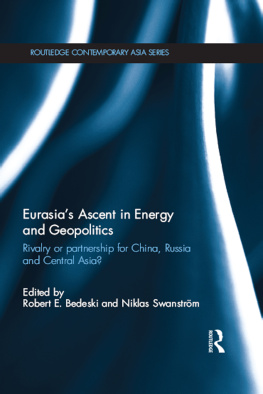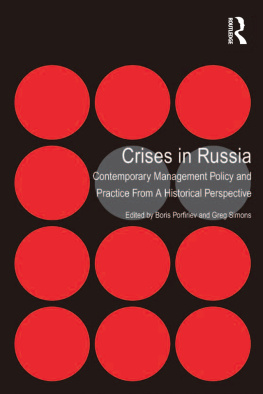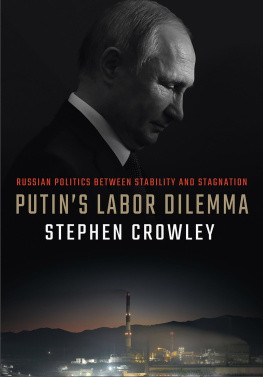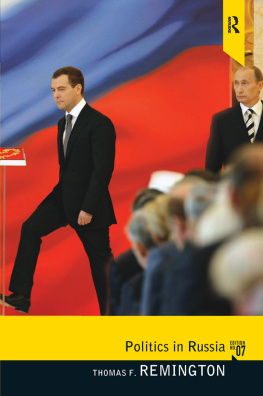ibidem Press, Stuttgart
Preface
This book addresses the issue of Russian wandering workers otkhodniks . They are a specific group of internal temporary labor migrants who migrate from small towns and rural areas to major cities and industrial centers. Among them, seasonal and agricultural workers are a negligible minority. In our view, these Russian labor migrants differ from both circular (circulatory) cross-border migrants and seasonal agricultural migrants, well familiar in many countries of the world. To highlight these differences, we refer to them as wandering workers (in Russian temporary departers ), and avoid using the terms circular migrants and seasonal workers more familiar to western researchers. A self-designation for such wandering workers a p peared in Russia about three or four centuries ago. People started calling them o t khodniks [from the Russian otkhod temporary departure], and this is the term they themselves and the Russian scientists still use.
Initially, we planned this monograph as a simple (authentic) translation of our book Otkhodniks , which appeared in Russian at the end of 2013. However, in the past year and a half, while the monograph was being translated, we continued our fiel d work supplementing the existing records by the findings of new expeditions, obse r vations and interviews. At the same time, we refined the conclusions made earlier based on the newly obtained field data, tested new hypotheses, and conceptualized our records. As a result, the English edition differs significantly from the Russian version both by the volume of the presented material, and by its analysis. Actually, it turned out to be a new book about otkhodniks. We have been collecting field data for this book continuously over five years, in summer and in winter. We have r e vised every chapter, expanded all of them, and added new ones. To the extent po s sible, the presentation of the material has been adapted for readers unfamiliar with the Russian reality in the sphere of labor behavior. In particular, wherever nece s sary, we have provided an explanation of the terms and events, which was not r e quired for the Russian readers. We have also provided a US dollar equivalent not only for all our estimates but also for the cost of various types of work and wages received by the otkhodniks. For this purpose, we applied the average official USD / RUB exchange rate effective at the time of the surveys, which was 30 32 r u bles per 1 US dollar (although, obviously, the purchasing power of the ruble in the Russian province was at th at time substantially higher). We are extensively quoting our respondents, and we have retained all the original colloquialisms, slang, and phonetics. To the extent possible, the translator has tried to convey this manner of speaking in the English text.
The co-authors contributed to this book as follows. Juri Plusnin supervised the r e search and development of the structure and content of the monograph, and co-wrote all the sections of the book. With the technical and editorial assistance of N a talia Zhidkevich and Artemy Pozanenko, he also re-wrote the entire text of the 2013 monograph, significantly amended and supplemented every chapter, and ad d ed two new chapters. Yana Zausaeva participated in writing chapters 4, 9, and 10 herein. Natalia Zhidkevich wrote chapter 8 and participated in writing chapter 5. Artemy Pozanenko took part in writing chapters 4 and 10, and was the principal a u thor of chapters 5, 6, and 7.
Preface to the 2013 Russian edition
Otkhodnichestvo as a phenomenon is not just a matter of academic interest for us. The senior co-author is himself an otkhodnik and experiences first-hand all the a d van tages and hardships of a " migra t ory " lifestyle. The three junior co-authors are involved in the matter in another way. For the past three years, we have traveled extensively ; we have visited dozens of small towns and villages and knocked on hundreds of doors. We are looking for, finding, and trying to engage in convers a tion a mostly unknown, however, extremely interesting and charismatic type of person who calls himself otkhodnik an archaic and seemingly long-forgotten (even by sociologists) term and who leads a busy and productive life filled with hard work and weary household chores.
We have spent many hours amid the otkhodniks talking to them and their families. As a result, we have adopted their viewpoints and to a certain extent even started identifying ourselves with them. Apart from an advantage, this also poses the threat of losing a researcher's impartial approach. Nevertheless, we did our utmost to maintain a clear perception and present our findings primarily as sociologists. It could be that in certain instances we deviated from this principle.
The book provides a sociological phenomenological (not statistical) overview of contemporary otkhodnichestvo and relies on the findings of our fieldwork. We chose to present only this aspect of the recurrent labor migration in Russia a one-sided approach does not always hinder research.
Writing the book turned out to be a long and complicated process; it was not easy to outline and summarize the interviews we had taken. Probably, partly due to this we failed to achieve all our objectives and feel a certain dissatisfaction with some aspects of our work. However, we count on the benevolence of our readers who chose at least to leaf through this book about otkhodniks, which is based on their words, stories and experience.
Acknowledgements
Three sponsors contributed to o ur empirical research of contemporary otkhodnic h estvo. This enabled us to make many expeditions to different small towns across Russia.
The Khamovniki Foundation for Social Research was our principal sponsor. Initia l ly, it allocated funds for our studies in 2010 2011; subsequently, in 2011 2012, it provided a special grant for the research of otkhodnichestvo (Project 2011-001 , O t khodniks in small towns ). T wo separate projects supported by the Foundation and implemented in 2012 2013 contributed to the research. These projects are: The s o cial portrait of the contemporary Russian otkhodnik , led by Natalia Zhidkevich; The social structure of local communities territorially isolated from public author i ties , led by Artemy Pozanenko . Thus, the diverse and lasting support of the Khamovniki Foundation enabled us to focus on the fieldwork . In addition, the Foundation sponsored the publication of the monograph Otkhodniks in Russian and financed its translation and issue in English. Such a supportive (friendly) attitude to our research of labor migration gave us the opportunity to realize our ideas fully . We are very grateful to Alexander Klyachin, Khamovniki Foundation Chairman of the Board, for his interest in the research of otkhodnichestvo and his understanding of the challenges involved. His position allowed us to perform extended field r e search in spite of the many difficulties facing such an ambitious project. We would like to express our gratitude to Cholpon Beishenalieva, Khamovniki Foundation Director, for her attention to our problems, her patience when it came to inevitable disruptions, and her ongoing support and encouragement. We are certain that the success of our research is largely a result of her efforts.
In 2011, when the project was already under way, support ed by the Khamovniki Foundation, we received assistance from the public Russian Foundation for H u manities in the form of a grant for field research of otkhodnichestvo (Grant No. 11-03-18022e, Otkhodniks in Russian small towns ). This allowed us to collect add i tional field data.
In 2012 2013, we received funding from the Academic Fund of the National R e search University Higher School of Economics for the research of a particular a s pect of the matter interaction of the otkhodniks with the municipal authorities ( Grant No. 11-01-0063, Will the economically active population become an ally of the municipal authorities? Analysis of disruptions in the relations between the local communities and the authorities , led by J.M. Plusnin).


